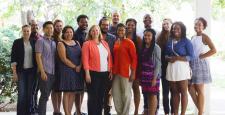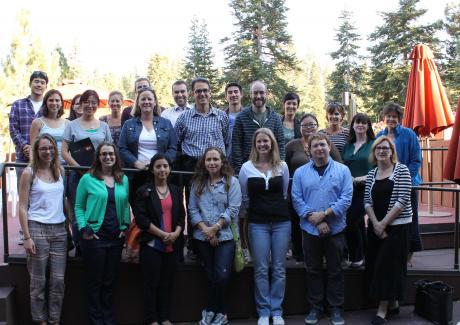Visiting Undergraduates Have an Intensive Summer Poverty Research Experience at UC Davis
August 11, 2015
DAVIS, Calif. — Eight undergraduates visiting UC Davis from historically black colleges and universities capped off their summer research experience with presentations on schools, stress and child development, trauma and memory and the Earned Income Tax Credit.
The presentations on August 5, 2015 were the culmination of eight weeks spent with faculty mentors through the 2015 Center for Poverty Research Summer Poverty Research Engagement Experience (UCD-SPREE). The program’s purpose was to provide training and experience in poverty research and to prepare these students to apply to graduate school. UCD-SPREE is part of the UC President Janet Napolitano’s UC-HBCU initiative that aims to increase diversity systemwide.
“All of these students immediately immersed themselves in a huge variety of new experiences and worked hard to make the most of their time at UC Davis,” said the center’s director Ann Stevens.Stevens is a professor of economics and currently interim dean of the Graduate School of Management.
Working with faculty mentors
This summer she mentored Francisco Brady, an economics major at Howard University, on studying the Earned Income Tax Credit at the state level.
London Arnold, a senior international studies major from Spelman College, conducted independent research on the Memphis, Tennessee public school system. She worked with faculty mentor Kevin Gee, an assistant professor in the School of Education.
Arnold studied how high-poverty schools performed academically compared to more affluent schools after the merge of two county school districts. The merger was intended to create a more diverse single district but the outcome, she found, has exacerbated existing inequalities.
“What’s going on in southern states is de facto segregation in public schools,” she said. This is particularly harmful for low-income students, she added. “It’s a critical time and a lot of students aren’t getting the push they need to advance their lives.”
Cynthia McLeod and Olivia Jones assisted Gail Goodman, a distinguished professor of psychology, on a project that explores how experiences of trauma and abuse affect memory. For eight weeks, McLeod and Jones transcribed interviews and searched online for participants who had taken part in Goodman’s 2008 study on childhood trauma.
“During these interviews, the researchers were sensitive that they were working with trauma victims,” said McLeod. “Moving forward as a researcher, I want to remember that each individual is a person, not participant 125.”
Jeremy Prim and Damien Waite, both sociology majors at Morehouse College, worked with Jacob Hibel, an assistant professor of sociology, to study charter schools. They wanted to compare how the lower percentage of credentialed teachers at charter schools compared to traditional public schools affects teacher workload.
Prim and Waite read over 20 published papers on the topic and learned STATA during their eight weeks on campus. This fall they will continue to work on a paper Hibel encouraged them to submit for the 2016 American Educational Research Association Annual Meeting.
Integrating the experience
Leah Hibel, an assistant professor of human development, mentored Symone Johnson and Taylor Ladson on her project studying stress and child development. Johnson and Ladson are both psychology majors at Spelman College.
Hibel said she was most impressed with their drive and foresight. “Both were very forward thinking. They integrated the ideas from this summer with their own future goals and aspirations.”
Most of the visiting undergraduates said they plan to apply to graduate school after the experience. Their visit through UCD-SPREE included guidance on writing application essays as well as GRE preparation. The students also have support to return to UC Davis for an upcoming Center for Poverty Research or other academic conference.
Hibel said that the skills they learned can also help them in careers outside of academia as well. “What the students are taking away from this experience goes beyond the research. In job interviews they can talk about being selected for a prestigious program, their training and the tasks they got to do. These are valuable to employers even outside academia.”
Applying for graduate school
Josephine Moreno, the graduate diversity officer for the Humanities, Arts and Social Sciences, said that UCD-SPREE is part of the university’s commitment to providing training for the next generation of scholars as well as equal access to higher education. Moreno worked closely with Stevens to connect with faculty at the participating HBCUs. She also coordinated the professional development component of the summer experience.
“We need a diverse graduate student body to not only add new perspectives to research and curriculum, but also to prepare our next generation of faculty,” she said.
This summer, eight UC campuses hosted a total of 85 HBCU undergraduates to have research experiences across fields of study, from the humanities to the hard sciences.
UCD-SPREE is one of five UC Davis UC-HBCU programs. These include SPREE, the UC Davis Evolution and Ecology Graduate Admission Pathways (EEGAP), UCD-HU Atmospheric Science Bilateral Graduate Admission Pathways (ASPGAP), UC Davis-Maryland Eastern Shore Molecular & Cell Biology Graduate Pathways and the UC Davis Summer Program for Literary Analysis and Success in Humanities (SPLASH), the newest program that will begin in 2015-16.
“My hope,” said Stevens, “is that we gave the students important new skills, along with an understanding of what life is like in a Ph.D. program at a top research university. I believe we will see applications from many of these great students in the coming years.”
Jones, who worked with Gail Goodman studying trauma and memory, said that she got a better understanding of all that goes into research. “I learned that research is not a one and done thing,” she said. “It takes time and patience.”
“This has been the best opportunity to do research,” said Prim, who with Waite worked with Jacob Hibel. “Being here has allowed me to see different resources and what’s available at schools like UC Davis.”
“This has been an experience that I know all of us will treasure for the rest of our lives,” said Waite.











